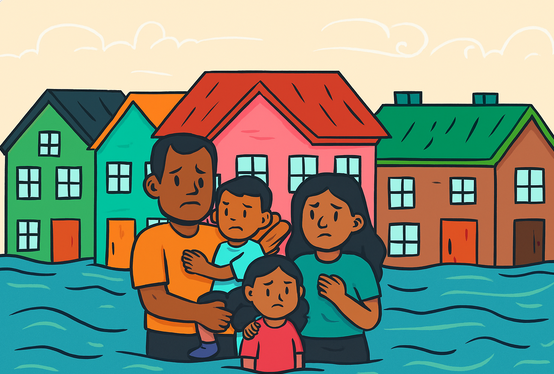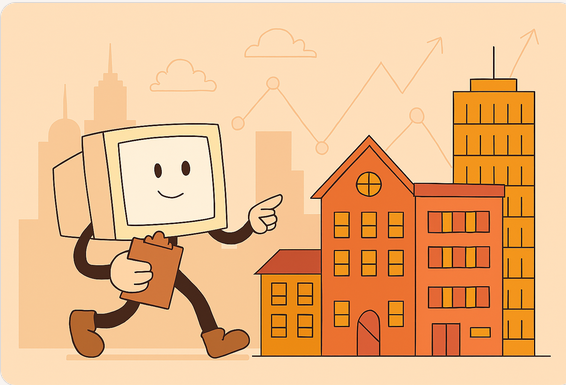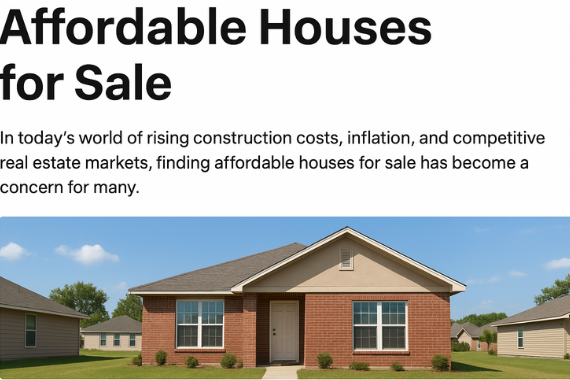The worst houses to buy in Lagos do not come with neon signs – even if they do have signage the words will likely say the opposite of what they truly are. It takes a keen eye, and some worldly experience to spot, and therefore avoid falling into these real estate traps.
The traps are so well concealed; faulty foundations but beautiful tiles, concrete floors but flooding with little rain, houses built on disputed land, and those that are terrorized by armed robbers – to name a few.
This article serves as a crucial guide, a map to the property minefields of Lagos. We will delve into the specific types of houses you must avoid, explaining the inherent risks and the dire consequences of ignoring them. Your house should give you peace of mind; it should give you security.
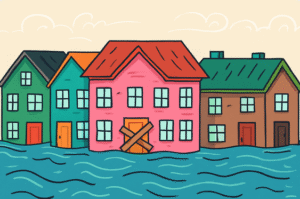
The Worst Houses To Buy In Lagos – Avoid These
1. Houses in Flood-Prone Areas
This one will likely spark a riot; it includes many of the “luxury estates” in places like Lekki. But seriously, it is, without a doubt, the single greatest physical threat to property in Lagos. Given the city’s coastal nature and its notorious issues with drainage and urban planning, buying in a flood-prone area is a gamble with very poor odds. What is the point of living in a flashy house when waist deep floods will drive you out every July? Besides, the seasonal rains do not merely cause inconvenience; they systematically destroy property and render land unstable.
The High-Risk Zones:
While flooding can occur unexpectedly in many parts of Lagos due to blocked drains, some areas are perennially and catastrophically susceptible.
Lekki Phase 1 (Especially the “Badore-Ajah” Corridor): Contrary to its upscale image, large swathes of Lekki, particularly the areas closer to the lagoon, are built on reclaimed land with a high water table. During heavy rainfall, the water has nowhere to go, leading to devastating floods that submerge cars, ground floors, and compound walls.
Victoria Island & Ikoyi (Certain Parts): Even these affluent islands are not immune. Properties in low-lying sections often experience “king tide” floods, where water from the Atlantic and the lagoon pushes inland without a drop of rain.
Ajegunle, Amuwo-Odofin, and Satellite Town: These mainland areas are crisscrossed by canals and creeks and are notoriously waterlogged. Drainage is often inadequate or non-existent, turning streets into rivers and homes into islands for months.
Ikorodu and Kosofe: These areas, bordering the Lagos Lagoon, experience some of the most severe and prolonged flooding in the state. Annual floods are a predictable disaster, destroying property and displacing residents.
If You Disregard?
Buying a house in these areas leads to a cascade of problems:
Structural Damage: Constant water exposure weakens building foundations, leading to cracks, sinking, and in extreme cases, collapse. The cost of foundational repair and reinforcement is astronomical.
Health Hazards: Stagnant water is a breeding ground for mosquitoes, leading to increased risk of malaria and other waterborne diseases. Damp walls foster mould and mildew, which can cause severe respiratory issues.
Property Destruction: Furniture, electronics, vehicles, and personal belongings are regularly destroyed. This is a recurring cost, not a one-time event.
Inaccessibility and Depreciation: A house you cannot enter or exit during the rainy season is not a home; it’s a liability. Property values in these areas stagnate or plummet, making it nearly impossible to resell without incurring a massive loss.
Due Diligence: Get a trusted real estate consultant. Before buying, investigate the area’s flood history. Visit during the peak of the rainy season (typically June to September). Talk to neighbours, not just the agent. Check the topography—low-lying areas are a red flag.
2. Properties with Defective Titles and “Omo-Onile” Threats
One of the worst houses to buy in Lagos is one with obscure land titles. The greatest threat to real estate acquisition in the city can come from human disputes over land ownership. If you are not careful you can end up fighting the “omo onile” and the government – a fight you cannot win.
The “Omo-Onile” (Landowners) Menace:
This is a uniquely Lagosian problem. Families or communities that are the original landowners may have sold the land multiple times, or they may believe their ownership rights extend far beyond the initial sale. The consequences for a buyer are severe:
Multiple Sales: The same plot of land can be sold to two or three different buyers, leading to endless and violent conflicts.
Frequent Harassment and Extortion: Even after you’ve purchased the land and built your house, “omo-onile” can resurface during construction, demanding money for “foundation levy,” “roofing levy,” or any other stage of development. This extortion can continue indefinitely. There are reports of “finishing touches levy.”
Vandalism and Violence: Refusal to pay can lead to the vandalism of your property, theft of building materials, and in some cases, physical assault.
Defective Titles and Government Acquisition:
This is an even more fundamental legal trap. “Omo onile” can steal your building materials, but government can bulldoze everything!
Lack of Governor’s Consent: A Certificate of Occupancy (C of O) without the Governor’s Consent for the transfer is not fully legal. Many properties are sold with only a “Receipt of Purchase” or a “Deed of Assignment” that has not been perfected at the land registry.
Properties on Government-Acquired Land: Large portions of land in Lagos, particularly in Lekki and along major corridors, have been acquired by the state or federal government for public projects. Buying a house built on such land means the government can reclaim it at any time, with little or no compensation. The new Lagos Airport road project in the Lekki-Epe corridor, for example, has exposed many such illegal structures.
Due Diligence: Engage a reputable lawyer— one with a reputation to defend. Conduct a thorough search at the Land Registry in Alausa to verify the authenticity of the C of O and confirm the land is not under government acquisition. This is non-negotiable.
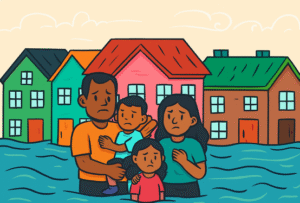
3. Houses with Critical Structural Defects
The pressure to provide housing in Lagos has led to many hastily and poorly constructed buildings. Some defects are cosmetic, but others are existential threats. Ask yourself: “why are they selling?”
Key Red Flags:
Visible Major Cracks: A crack you can see is no longer a crack; it is the Red Sea – when Moses divided it. Especially those that run from the top of a wall to the bottom, are signs of foundational settlement or failure. Small cracks are common, but significant cracks are a screaming siren.
Sagging or Bouncing Floors: If the floor feels unstable or bounces when you walk on it, don’t inspect anything again. Just run before the house collapses on your head!
Improper Foundations in Waterlogged Areas: In areas like Lekki or Ikorodu, buildings must be constructed on reinforced raft foundations or pilings. Many are built on simple, shallow strip foundations that are doomed to sink.
Use of Substandard Materials: To cut costs, some developers use substandard cement, low-grade reinforcement rods, and poor-quality sand. This compromises the structural integrity of the entire building, making it vulnerable to collapse.
The Consequences: The ultimate consequence is building collapse, a tragic and frequent occurrence in Lagos. Even if it doesn’t collapse, the cost of remediating foundational or structural issues often exceeds the value of the property itself.
Due Diligence: Never, ever buy a property in some areas without an independent structural engineer’s report. The cost of the inspection is tiny compared to the potential loss.
4. Houses With No Roads
Unless you have learned how to fly, you better pay attention to this! A beautiful house in an inaccessible location is a beautiful cage. You cannot go, you cannot come. Lagos traffic is legendary, and the daily commute can erode your quality of life, health, and productivity.
The Congestion Hotspots:
Lekki-Epe Expressway (Particularly the VGC to Ajah stretch): What looks like a short distance on a map can become a multi-hour ordeal during rush hour. The reliance on a single, perpetually congested corridor is a major planning failure.
Apapa and Its Environs: The traffic in Apapa can kill! The gridlock caused by port activities has made Apapa and surrounding areas like Amuwo-Odofin virtually uninhabitable for those not working directly within the port.
Ikorodu Road and Funsho Williams Avenue: These are the main arteries of the mainland and are perennially clogged.
Areas with Only One Access Road: Many new estates in the Ibeju-Lekki area and other outskirts are built with a single point of entry and exit. An accident or breakdown on that road can completely paralyse the entire community.
The Consequences: The daily stress is immense, leading to burnout and health issues. It steals time from family, hobbies, and rest. Furthermore, properties in these areas see slower appreciation because the primary deterrent for buyers is the debilitating access.
Due Diligence: Test the commute yourself. Drive from the property to your workplace during morning and evening rush hours before making a decision.
5. The Isolated Houses
The rise of gated estates on the fringes of Lagos promises security and serenity. However, some of these estates are so isolated that they lack the basic fabric of community life. Maybe its clever marketing, but there are so many things wrong with this idea.
The Pitfalls of Isolation:
No Proximity to Markets, Schools, or Hospitals: Having to drive 30 minutes to buy a loaf of bread or get basic groceries is not sustainable. In the case of a medical emergency, isolation can be dangerous.
Security Risks: An isolated estate, especially one that is not fully occupied, can become a target for criminals. The “security” offered by the perimeter fence is only as good as the vigilance of the few residents.
Lack of Community: A house is more than a structure; it’s part of a community. What good is a basketball court when there are only two or 3 children living on an estate? Isolated estates can feel lonely and sterile, lacking the vibrant street life and social interactions that make a neighbourhood a home.
Due Diligence: Before buying in a new estate, investigate the developer’s master plan. Are there provisions for commercial centres, schools, and clinics? What is the current occupancy rate? A half-empty estate is a red flag.
Conclusion:
The Lagos property market is not for the faint-hearted. The dream of homeownership can quickly devolve into a nightmare if one is not meticulously cautious. The worst houses to buy in Lagos are not always the ones that look dilapidated; they are the ones hiding fatal flaws beneath a fresh coat of paint, or those standing on legally contested land.
The common thread running through all these scenarios is the absolute necessity of thorough due diligence. This is not an area to cut corners. The money saved by skipping a lawyer’s fee or an engineer’s inspection will be spent a hundred times over on litigation, repairs, or medical bills.
Arm yourself with patience, engage independent professionals, and trust your instincts. In the frenetic race for property in Lagos, the slowest, most deliberate buyer often wins. Remember, a house should be a sanctuary, an asset that appreciates and provides comfort—not a source of unending trouble and financial ruin. Choose wisely.
